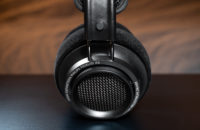My stance on the headphone jack hasn’t changed, but I have

I’ve started thinking more about the headphone jack in smartphones now that true wireless earbuds have become excellent products.
I’m not wavering from my position that killing off the previously ubiquitous 3.5mm port on smartphones was a bad thing. It was, it is, and if you have any concern for the environment, likely always will be.
But I realized this week I haven’t utilized a headphone jack in months, despite listening to more audio than ever.
And it’s all thanks to podcasts.
A tale of podcasts and earbuds

After not really buying into the world of AirPod-alikes for a year or two, podcasts have been a catalyst for me to listen to way more audio than I ever have before, especially on the go. As podcasts have become better and increased in number, I’ve found them invaluable for keeping up with interests and hobbies, and for work as well.
Read more: The best podcasts you can listen to
This newfound podcast love has put me on board with wireless earbuds, over any other audio product, wired or otherwise, for my audio needs on-the-go (I stick with wired for music and gaming at home).
The added portability, lack of wires, better ear fit, and comfort is fine even for a longer podcast run. Battery life, depending on your purchase, has finally reached a point where earbuds are good enough for hours of listening without needing a recharge. Audio fidelity, which will probably always be lacking in these tiny devices for bonafide audiophiles, is easily good enough for most podcasts that usually consist of spoken words and phone call conversations.
It wasn’t always like this. Previously I would use either any pair of terrible wired earbuds that came with the box of whatever phone I owned or was testing at the time, or a larger pair of Bluetooth Plantronics Backbeat Pro 2 headphones, but those were a bit big and troublesome while biking. Even with Bluetooth, if I forgot to charge them they had to be plugged in, and I would usually manage to tangle myself in the cable at some point.
Wireless earbuds, with the clever bonus of a battery bank in the case, changed that. It helps that I’ve come into them after at least a generation or two of tech improvement in the three years since Apple launched the AirPods alongside the iPhone 7. Since then, Apple’s AirPods range sold more units than iPhones were sold in its first three years of sales: 61 million pairs of AirPods vs 60 million iPhones, according to Above Avalon.
Next-gen tech like active noise-canceling and designs that don’t make your ears feel blocked are now common. IP ratings are also standard for premium buds, and most ears can be accommodated thanks to improved ergonomics. The downside really is that true wireless connectivity isn’t always amazing, but it does depend on the brand you go for. In summary, they’re still a long way from perfect but most people will find the portability too good to go without. They’re now an automatic include for my bag or pocket on any journey.
I even managed to fall for wireless earbuds wearing a fairly low-cost, average-battery life pair of Skullcandy Indy earbuds. I don’t recommend them generally, but they still provide just enough of the magic that sells people on earbuds.
Buy better, thank me later

On that note, I’ve also tried the Samsung Galaxy Buds, which I would recommend, and the Apple AirPods Pro. The rapid conclusion I reached from jumping between these earbuds wasn’t so much a preference for either, but that spending a touch more is well worth it, particularly for battery life, fit, and audio quality.
Better battery life and better quality earbuds are worth the money.
Battery life is the big one. Better models have longer playback and a solid enough charge in the pack. Here’s a chart from our sister site SoundGuys showing their battery life testing of loads of different models — I wouldn’t recommend you go for a pair with less than four hours playback time unless offered a crazy bargain:
Preferences change
![]()
Even having said all of the above, I’d still prefer that devices like smartphones had a headphone jack. We rely on them throughout every day, and it’s a tiny monetary and moderate space cost that makes a useful difference. Not including one and implicitly demanding people pay up for Bluetooth audio is crummy, even if it is good for company bottom lines. Plus, higher-quality music and audio still just doesn’t happen without a wired connection.
I don’t use my headphone jack on my smartphone anymore, although I haven’t changed my views. But thanks to podcasts and my altered listening habits, I can finally see how some buyers don’t find it an issue anymore.
More posts about Audio
from Android Authority https://ift.tt/36l7Tap













Post a Comment